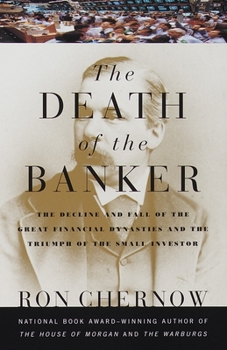The Death of the Banker: The Decline and Fall of the Great Financial Dynasties and the Triumph of the Sma LL Investor
Select Format
Select Condition 
Book Overview
"For anyone interested in the world behind the business-page headlines, this is the book to read." --Publishers Weekly With the same breadth of vision and narrative élan he brought to his monumental biographies of the great financiers, Ron Chernow examines the forces that made dynasties like the Morgans, the Warburgs, and the Rothschilds the financial arbiters of the early twentieth century and then rendered them virtually obsolete by the century's...
Format:Paperback
Language:English
ISBN:0375700374
ISBN13:9780375700378
Release Date:July 1997
Publisher:Vintage
Length:144 Pages
Weight:0.39 lbs.
Dimensions:0.4" x 5.2" x 8.0"
Customer Reviews
5 ratings
Twelve years ahead of its time
Published by Thriftbooks.com User , 15 years ago
As other reviewers have mentioned, the main part of this book is an essay about the historical transformation of finance, which is then illustrated by brief accounts of the Morgan and Warburg banking dynasties and collateral historical material. I did not read this when in came out in 1997, because I had read the longer Chernow works, including The House of Morgan and The Warburgs. I picked it up for a train ride the other day and was astounded at its prescience. Chernow sketches the development of early finance arising naturally out of merchant activity and evolving into more specialized institutions subservient to users of capital (usually princes fighting wars). As finance globalized but information technology stagnated, bankers grew in power relative to their borrowers, reaching a peak around 1900. Changes in laws and information processing increased the stature of the great corporations, which evolved their own banking services just as early modern merchants had done 500 years earlier. Somewhat later, demographic and other changes empowered suppliers of capital. These two trends squeezed out the banker. This is a simple story and even with elaboration makes a short book. What's astounding to me is how well this account explains the twelve years since it was published. It's hard to imagine how someone could see so clearly at a time when some of the most prestigious banks (including Goldman Sachs and Lazard Frères) were private partnerships, Glass-Steagall was in force and equity underwriting was the hot business. Chernow ignored all that, looking to a time when finance was dominated by diversified public companies, Glass-Steagall and banking regulation in general was irrelevant and underwriting and advisory work were minor side businesses to asset management and proprietary trading. I suppose the moral is that a historical perspective is more valuable than detailed study of current events. In any case, I recommend this book both as a quick, pleasant read and a useful counterweight to books over-reacting to last month's events.
Top notch historical overview of investment banking
Published by Thriftbooks.com User , 17 years ago
Published in 1997, this book, marking the modern transformation of banking, is a small addition to the Ron Chernow continuum of great American historical writing about finance; Hamilton, Rockefeller, House of Morgan and the Warburgs. What's next? I can not wait.
Excellent!
Published by Thriftbooks.com User , 22 years ago
Brief, to the point and informative. A great anthology of how the financial world got from where it was to where it is now. Chernow is a master financial historian.
As much as you can get from such a small book you shall get
Published by Thriftbooks.com User , 25 years ago
Death of the banker by Ron ChernowDisappointing when you know the Warburgs, but anyway worthwile reading when it is read as intro to US Banking history. The book is an enlargement of a speech held by the author in earlier times. Thus, it centers in the first part strongly on the development and undevelopment of banking in USA. But reader beware, the title is misleading. Chernow really envisages the personal banker, the likes of Warburg or in particular J.P. Morgan and his power. So the power of banks has shifted, but will never expire as the author himself admits. The short stories of the lifes of the Warburgs and Morgan are nice first reading, but lack depth and analysis. Recommendation : If you lack time, read it, otherwise you are better off with the authors more precise works.Dr. Rudolf C. KingCEO princeandprince.com
Excellent description of the transformation of Banking
Published by Thriftbooks.com User , 26 years ago
While this book serves as a superb guide on the evolution of the Banking Industry over the past two centuries, it's strength is in its description of how bankers have been forced to change their focus towards individual investors and depositors over the last several decades. Very well written!






